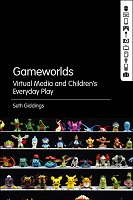Gameworlds
Virtual Media and Children's Everyday Play
Author(s)
Giddings, Seth
Collection
Knowledge Unlatched (KU)Language
EnglishAbstract
Game studies is a rapidly developing field across the world, with a growing number of dedicated courses addressing video games and digital play as significant phenomena in contemporary everyday life and media cultures. Seth Giddings looks to fill a gap by focusing on the relationship between the actual and virtual worlds of play in everyday life. He addresses both the continuities and differences between digital play and longer-established modes of play. The 'gameworlds' title indicates both the virtual world designed into the videogame and the wider environments in which play is manifested: social relationships between players; hardware and software; between the virtual worlds of the game and the media universes they extend (e.g. Pokémon, Harry Potter, Lego, Star Wars); and the gameworlds generated by children's imaginations and creativity (through talk and role-play, drawings and outdoor play). The gameworld raises questions about who, and what, is in play. Drawing on recent theoretical work in science and technology studies, games studies and new media studies, a key theme is the material and embodied character of these gameworlds and their components (players' bodies, computer hardware, toys, virtual physics, and the physical environment). Building on detailed small-scale ethnographic case studies, Gameworlds is the first book to explore the nature of play in the virtual worlds of video games and how this play relates to, and crosses over into, everyday play in the actual world.
Keywords
Social Science; Media StudiesISBN
9781623566326, 9781501318290, 9781623566326, 9781623563899, 9781623568023Publisher
Bloomsbury AcademicPublisher website
https://www.bloomsbury.com/academic/Publication date and place
2014Grantor
Imprint
Bloomsbury AcademicClassification
Media studies


 Download
Download Download
Download